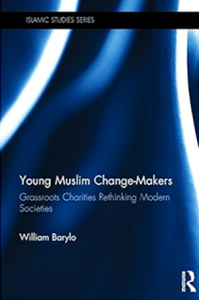Young Muslim Change-Makers: Grassroots Charities Rethinking Modern Societies

Author: William Barylo
Publisher: Routledge
Year of Publication: 2018
Print Length: 162 pages
Genre: Non-Fiction / Sociology, Social Science
Area: Europe
Topic: Charity, Volunteer & Volunteerism, Altruism, Islam, Culture & Society; Modernity, Modernism, Modern; Social Movement, Social/Aid Workers, The Muslim World, Civil Participation, Citizenship, Extremism, Islamophobia, Colonialism & Post-Colonialism, Democracy, Secularism, Neoliberalism, Consumerism
The Muslim charity sector is stronger than ever, attracting thousands of volunteers and millions of pounds in donations. In times of mobile internet and social media, young people have set up small scale charities in urban areas, providing general social services to Muslims and non-Muslims alike. Breaking away from bureaucratic non-governmental organisations and traditional faith-based charities, these smaller local associations are an attractive alternative to young people.
This book offers an exploration of the Muslim charity sector, from multi-million pound NGOs to discrete grassroots charities who are quietly giving rise to the next generation of Muslim entrepreneurs, scholars, politicians and other influencers. From studies of eleven charities across France, Poland and the UK, it investigates key questions around this young and dynamic movement:
- What motivates these young Muslim volunteers?
- What shapes the socially-engaged behaviour of young Muslims?
- What is the place and the role of Islam in their involvement and commitment to their causes?
- What social impact do these organisations have in their local area?
- How do they understand religion, faith, participation and citizenship?
- What challenges do they face and how do they overcome these?
- The book also examines how these grassroots are successful in helping to prevent extremism, curb Islamophobia and challenge colonialism.
The analysis of these small, local and original initiatives is fundamental in understanding the role of religiosity for these younger generations who are trying to articulate their multiple identities, cultures and traditions in a modern, secular society. Rich, detailed and vivid, the book sheds new lights on a popular field of research, unveiling exclusive key information on the subject of young European Muslims.
Table of Contents
List of illustrations
List of tables
Acknowledgements
List of acronyms
Introduction
Context
Significance and relevance
Research questions
Theoretical framework
Book structure
1. What sociology for Islam?
Beyond religion
Participating Muslims
2. Muslim grassroots charities and method
A brief history of European Muslim charities
Study sample: young, skilled and diverse
Methodology, phenomenology and ethics
3. Islamophobia: Countering alienation
Has Europe alienated its citizen?
Dialogue as a key for contemporaneity
Agents of negotiation, agents of trust
4. The attractive middle way
Charities as convivial social capital power plants
Building identity: giving a meaning to life
Different, efficient and therefore attractive
5. Crafting an active citizenship
Staying committed
Shura, the viable chimera of democracy
6. Neoliberal metacolonisation
Muslims, consumerism and neoliberalism
Metacolonialism and radical monopoly
The paradox of Muslim managerialism
7. From resistance to self-determination
Coping mechanisms
Emotional theology and alter-system mind-set
Conclusion
Glossary of Arabic terms
Index

William Barylo is an independent researcher in sociology focusing on the articulations between diasporic cultures, religions and hyper-modernity from a decolonial and restorative perspective. He is an awarded photographer and film-maker having directed the documentary ‘Polish Muslims: an unexpected meeting,’ premiered at the Polish Embassy in London and the author of ‘Young Muslim Change-Makers’.
Source: https://www.middleeasteye.net/users/william-barylo
More from William Barylo in this library, click here.
